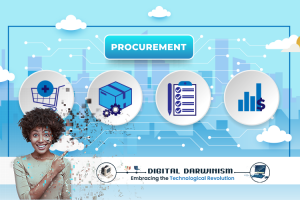Every one knows that controlling the inputs into the supply chain via the Procurement process is key for creating sustainable business success, says James Yates, COO at Cutting Edge Commerce. “Recent reports in the press relating to unauthorized
procurement and irregular sourcing activities in all sizes of organizations, both in the public and private sector are symptoms of a lack of visibility,” he told SmartProcurement.
“It is impossible to control the inputs into the Supply Chain without visibility into accurate and
complete transactional data within all the procurement functions of the
organisation.”
Two major types of solution for procurement visibility have traditionally been used to create procurement management practices within organisations worldwide.
- One solution is the commissioning of an external service provider to develop a solution, which would provide the necessary insight into the company’s procurement activities. This route was usually taken as a result of the firm realizing its own limitations in accessing reliable information from its ERP, manual and other systems.
- The other solution, employed by organizations choosing to keep their data confidential, resorted to using scarce internal resources to extract the required data without having the expertise or technical know-how to do it, “he says.
Major shortcomings in both
“Both traditional solutions have demonstrated significant short comings in their ability to deliver value to the implementer. A number of problems exist.
- The Outsourcing solution is typically extremely expensive and time consuming. It also places significant pressures on the internal resources of the organization if the implementation is to deliver the promised value.
- Although it protects organisational information integrity the In-sourcing solution has always been a very expensive and inefficient solution. It has been estimated that not more than 10% of procurement managers have the necessary expertise to extract management information on which critical business decisions can be based.”
New industry trend – Operational Business Intelligence (OBI) within hours after events
” A new industry trend is the emergence of Operational Business Intelligence (OBI) as a mechanism for managing the procurement environment. Progress has recently been made by specialist service providers in developing modular, ready-to-run solutions, which obviate the need for months of content and software development time. Bringing together the best of the consulting and IT world, procurement specialists and I.T. professionals have collaborated to create products that give immediate and clear insight into mountains of transactional data.
Significant advantages can be realized by organizations through the proper implementation of OBI within the procurement environment.
- Management decisions can be supported within hours as the data is converted into usable information which can be used in determining strategic direction
- Auditing the procurement function internally has always been a challenge and is rarely conducted regularly or in a standardized manner. Very often these results are also not acted upon appropriately rendering the complete exercise ineffectual. There are regular reports in the press relating to unauthorized procurement and irregular sourcing activities in all sizes of organizations, both in the public and private sector.
- In many instances the new ways of data interrogation highlight instances of inherent weaknesses in underlying processes e.g. if the master data is not properly controlled and managed, many resulting transactions and activities may be unprofitable and worse, contrary to company policy, ” he tells SmartProcurement.
Engagement model that will ensure BI as an enabler of world class procurement practice
Proppie Fraser a business intelligence expert with CEC says that: “In order to realize these possible benefits of OBI in the procurement practice of the organization it is critical to follow a practical engagement model with the proposed supplier. Many organizations have implemented one or more “business intelligence” modular solutions within the procurement function and had high levels of success for the required decision support. The following aspects, common across these successful implementations, have been identified as critical success factors:
- Ensure sustainability through the appropriate roll-out of organisational structures, skills, tools and program management
- Define and agree the outcomes of the proposed implementation with all internal and external parties.
- Identify data sources and validate data quality at the transactional level.
- Create applicable management information, available at the appropriate time intervals which supports strategic decision making. “
” It is with the last aspect that most traditional methods fail. Implementers always require additional consultant assistance to interpret the outputs of OBI initiatives. The latest thinking provides outputs which are clear, concise and designed to highlight the critical issues on which action can be taken. ”
In closing
“OBI within the procurement space could provide the organization with a competitive advantage within their chosen industry, but it is not a silver bullet that will solve all problems. With proper planning and goal oriented management OBI could play the intended role for the implementer and the money spent on external consultants would stay within the organization and not leave when the consultants leave,” says Fraser.
James Yates is a procurement management specialist, consulting widely within procurement functions of major South African organisations. James can be contacted at jamesy@ce-commerce.biz
Proppie Fraser is a supply-chain specialist with years of practical management experience in major South African private public sector organisations. Proppie can be contacted at proppief@ce-commerce.biz


























